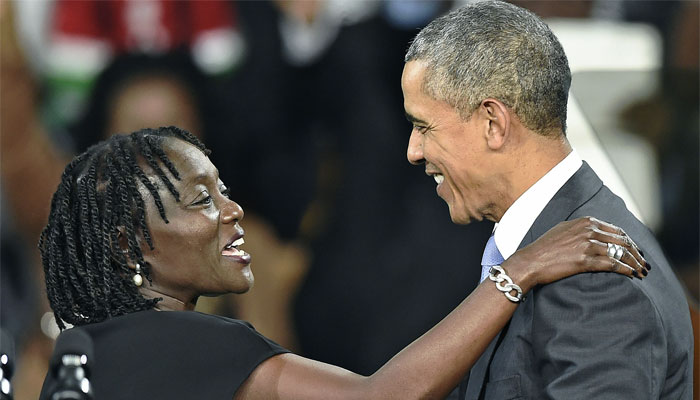US President Barack Obama (R) embraces his sister Auma at the Moi International Sports centre in Nairobi. AFP
AFP/Nairobi
Billing himself as America's first Kenyan-American president, Barack Obama implored Kenya's youthful populous to cast aside "bad traditions" and forge a more just and inclusive future Sunday.
Seeking to leverage his status as a "son of the soil" and his vast local popularity, Obama said his ancestral homeland was at a crossroads replete with peril and opportunity.
"The future of Africa is up to Africans," he told a raucous crowd in an indoor arena at Nairobi's Kasarani stadium complex.
"For too long I think that many looked to the outside for salvation and focused on somebody else being at fault for the problems of the continent," he said.
Taking up the mantle of brother and well-wishing friend, he sketched out the prospect of country poised to make its mark on the world.
"We can see that future for Kenya on the horizon, but tough choices are going to have to be made.
"Treating women as second class citizens is a bad tradition, it holds you back," he said.
Much of Obama's speech stressed his affinity with young Kenyans, a vital group in a country where 60 percent of the population is aged under 24.
"He gets us," said his half-sister Auma, introducing a man she described as "my brother, your brother, our son."
Compounding that message, Obama recalled details of pre-presidential trips to Kenya replete with the stuff of everyday life: broken down cars, traditional foods and lost luggage.
"That doesn't happen on Air Force One," he joked.
Throughout his two day trip, Obama has tried to bridge two constituencies: Americans reexamining their stereotypes of Africa, and Africans hoping for a better future.
But the friendly, aspirational message belies a hard-noised security need.
A young, but impoverished population could be fertile ground for instability and the growth of groups like Al-Shebab, which has plagued the country.
Obama stressed the need for economic growth, lower levels of corruption and a sense of national unity that casts ethnic differences aside.
In 2007 and 2008 election-fuelled clashes between rival ethnic groups killed more than 1,000 people and forced hundreds of thousands more from their homes.
Kenya's deputy president William Ruto still faces crimes against humanity charges at the International Criminal Court (ICC) in relation to the violence.

